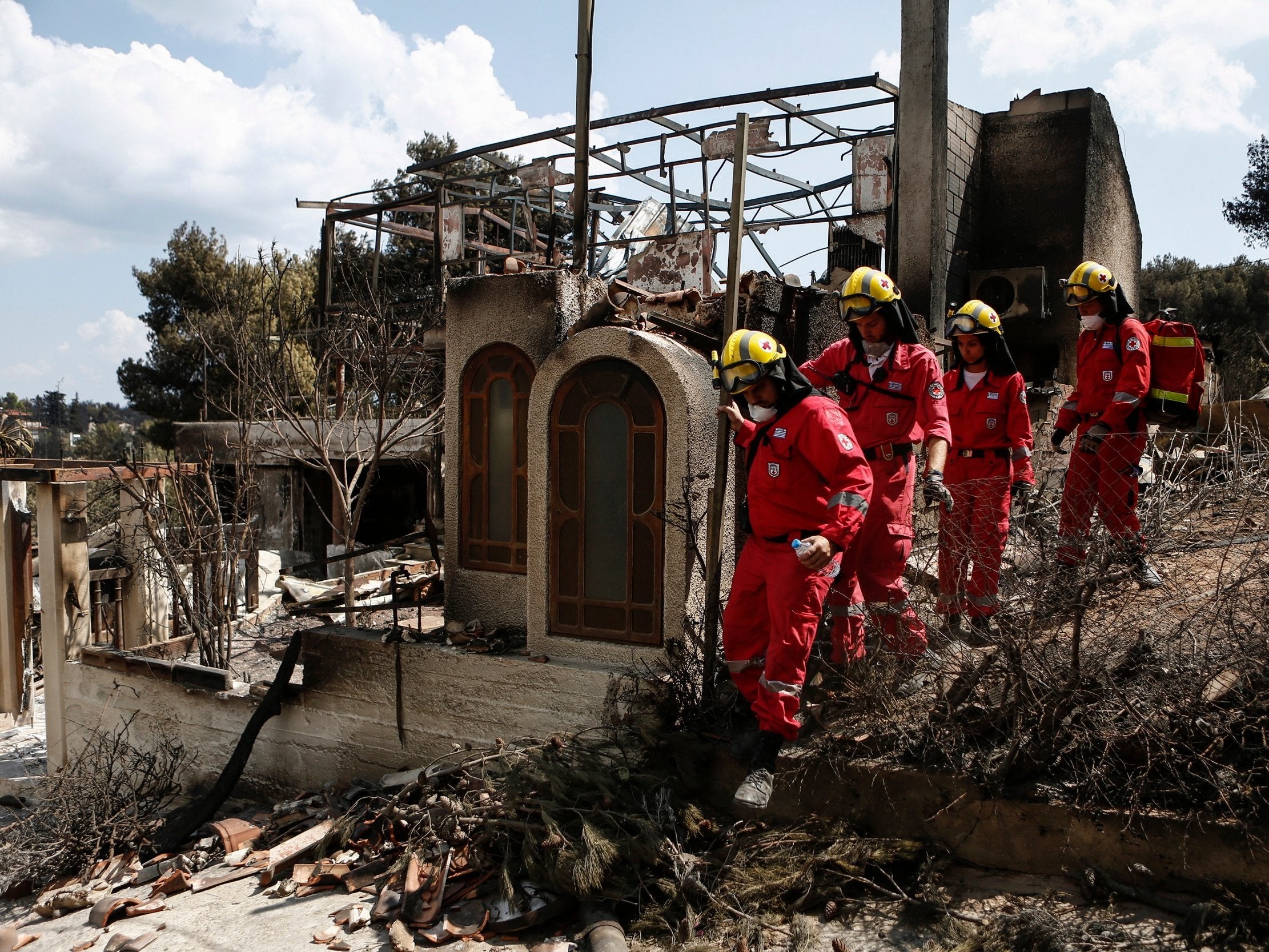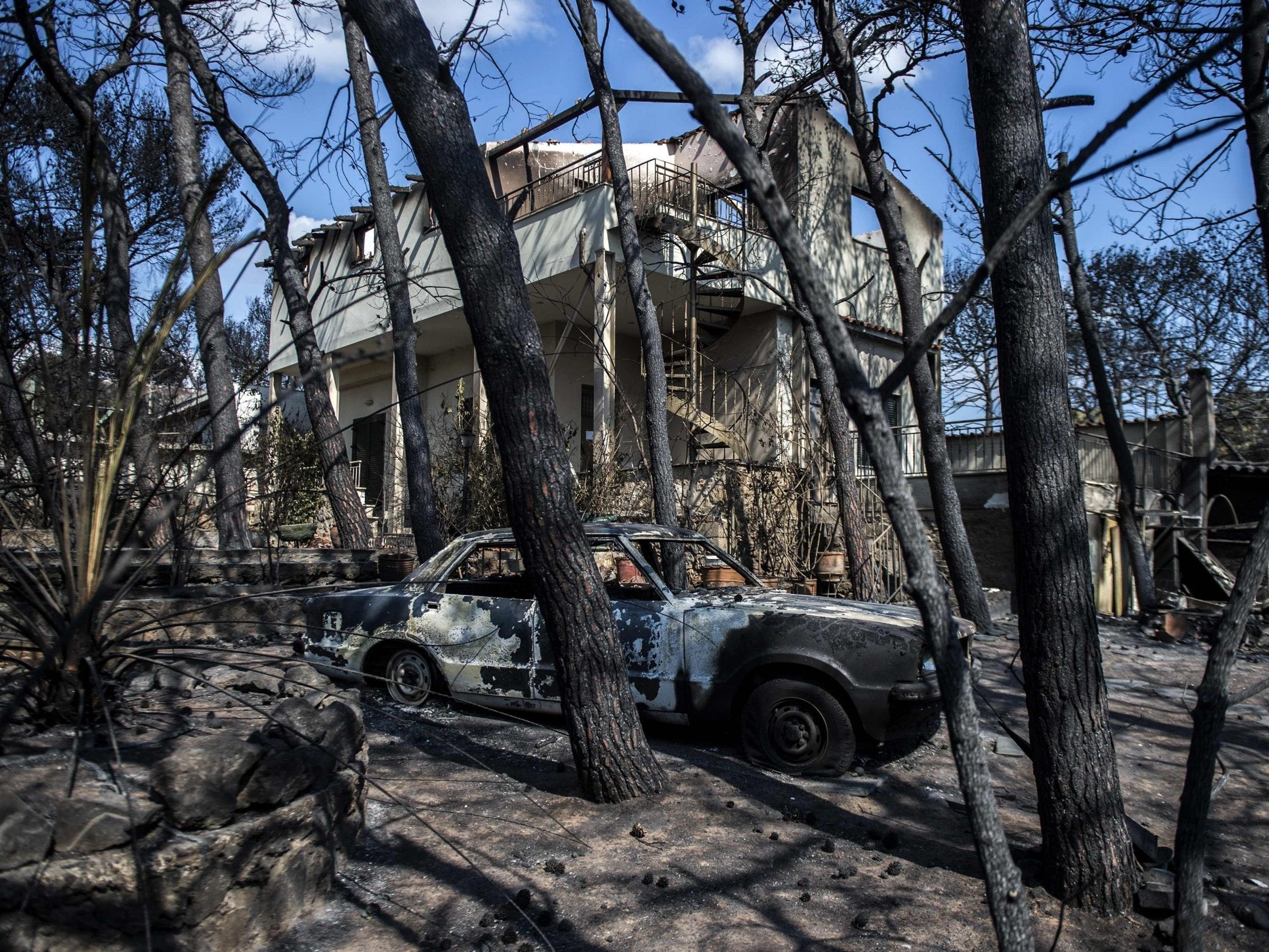‘There are no words to describe it’: Survivors of Greek wildfires face horror of searching through ashes for loved ones
At least 80 people have been killed, and 150 are missing, after deadliest forest fires in a decade

Your support helps us to tell the story
From reproductive rights to climate change to Big Tech, The Independent is on the ground when the story is developing. Whether it's investigating the financials of Elon Musk's pro-Trump PAC or producing our latest documentary, 'The A Word', which shines a light on the American women fighting for reproductive rights, we know how important it is to parse out the facts from the messaging.
At such a critical moment in US history, we need reporters on the ground. Your donation allows us to keep sending journalists to speak to both sides of the story.
The Independent is trusted by Americans across the entire political spectrum. And unlike many other quality news outlets, we choose not to lock Americans out of our reporting and analysis with paywalls. We believe quality journalism should be available to everyone, paid for by those who can afford it.
Your support makes all the difference.Stepping over the charred rubble that was once the entire contents of a living room, John Kadikis looks around and shakes his head.
Singed bird cages and bed springs are scattered over a carpet of ashy white plaster and melted glass from windows – but there are no bodies here. He and his co-volunteer rescue workers move on to the next house.
“We’ve been searching door-to-door since yesterday,” says Kadikis, who works for the NGO Crisis Management Team, or ODIK in Greek, as he wipes the sweat from his brow.
“So far we have found only pets that were trapped in the yards. I hope we will not find bodies.”
“The last time I saw something like this was in 2007,” adds fellow volunteer Vangelis Forinakis, referring to the forest fires in Greece’s Peloponnese. He gestures at the apocalyptic scenes around him: “There are no words to describe it.”
Greece was in mourning Wednesday as the number of casualties from the deadliest forest fires in a decade continued to climb past 80. The fires hit areas east and west of the capital, Athens, with the holiday resort village of Mati hardest hit.
More than 280 firefighters were still in the area to the northeast of Athens in the wider Rafina area, dousing the remaining flames to prevent flare-ups. A further 200 firefighters, backed up by a water-dropping helicopter, were tackling the second forest fire west of the capital, near Agioi Theodoroi, where local authorities preemptively evacuated three communities, a children’s summer camp and three monasteries overnight, according to the fire department.
Although there is no formal count, more than 150 people were still believed to be missing nationally as of Wednesday evening, according to Mr Forinakis.
A website set up at missingpeople.audax.gr for people to post photographs listed some 28 men, women and children of all ages, including two nine-year-old twin girls and their grandparents. Nearly 20 are from Mati.
The popular seaside spot is just a short drive from the tourist-packed port of Rafina, where ferries depart daily to summer hotspots such as Mykonos island.

Although the port was unharmed, Mati and the pine-covered surrounding areas were ravaged by blazes that began Monday and raged overnight into Tuesday, fanned by winds of up to 60 miles per hour that also severely hampered firefighting efforts. Around 1,000 houses and 300 cars have been destroyed, according to the mayor of Rafina.
Most of Mati’s inhabitants managed to flee to the sea or neighbouring villages, but not everyone. The heavily burnt bodies of 26 people – including children – were found huddled together on a cliff top here shortly after the fires died down. It’s believed they were trapped while trying to escape to the water.
More gruesome discoveries like this are expected as hundreds of firefighters, army personnel and volunteers continued to comb the affected areas for victims.
In Mati, where the smell of smoke hangs heavy in the air, an 84-year-old woman whose son had been searching for her since Monday was finally found and identified. Police and reporters gathered around the entrance to a small, burnt-out house whose roof had collapsed as her remains were transferred to a black coffin and loaded into a hearse. Her son and granddaughter sobbed inconsolably as they looked on.
The heavy death toll makes people like Peggy Guinness feel lucky to have escaped with their lives.
“I live here with my husband and two children, a one-and-a-half-year-old girl and a 16-year-old-boy,” she explains, as helicopters towing buckets of water to remaining blazes buzz over ahead.
“We saw the fire and just took our two cars and drove. We only have the clothes you see on us now.”
“Our house is totally destroyed, there’s nothing left,” she says, pointing to the scorched doorway to her home now marked by little more than piles of blackened roof tiles.
Our house is totally destroyed, there’s nothing left ... We have to be strong now, for the children
Inside, what was once a family home is now just a shell of a building, the metal parts of light fixtures, beds and a child’s tricycle the only remains of the Guinness’s life’s possessions.
“We have to be strong now. for the children,” she says, taking a deep breath. “We have nothing else so it’s the only way. We don’t have insurance but the government will help, we hope.”
Prime Minister Alexis Tsipras has declared three days of national mourning and announced €20m (£18m) in emergency funding for affected areas on top of €10m for those who have lost homes and loved ones.
The pledges come amid criticisms that there was no evacuation plan in place and that the government and emergency services responded too slowly once the fire was underway.
On Monday Greece activated the European Civil Protection Mechanism – which provides support in case of disasters – and has since been offered support from throughout the EU in the form of planes, personnel and monitoring assistance.
“The European Commission will not spare its efforts to help Greece,” tweeted President Jean-Claude Juncker.
Informal donation points and shelters have also sprung up at restaurants, shops and hotels around the area, providing water, food and a place to rest for those in need.
Forest fires are not uncommon in Greece but a dry winter and recent temperatures of up to 40C have created the perfect tinderbox conditions. However, officials have hinted at foul play, suggesting that arsonists may have started the fires in order to loot abandoned homes.
“Fifteen fires were started simultaneously on three different fronts in Athens,” said government spokesman Dimitris Tzanakopoulos, adding that Greece had requested drones from the US to “detect any suspicious activity”.
Four people were arrested Tuesday in the fire-stricken Neu Vujza area near Mati for burglary, according to the Greek police.
A Supreme Court prosecutor has ordered a probe into the cause of the disaster and the Greek anti-terrorist service is investigating as well, a security source said. Arson is often thought to be behind some fires in a crude attempt to clear forest land for building.
Join our commenting forum
Join thought-provoking conversations, follow other Independent readers and see their replies
Comments